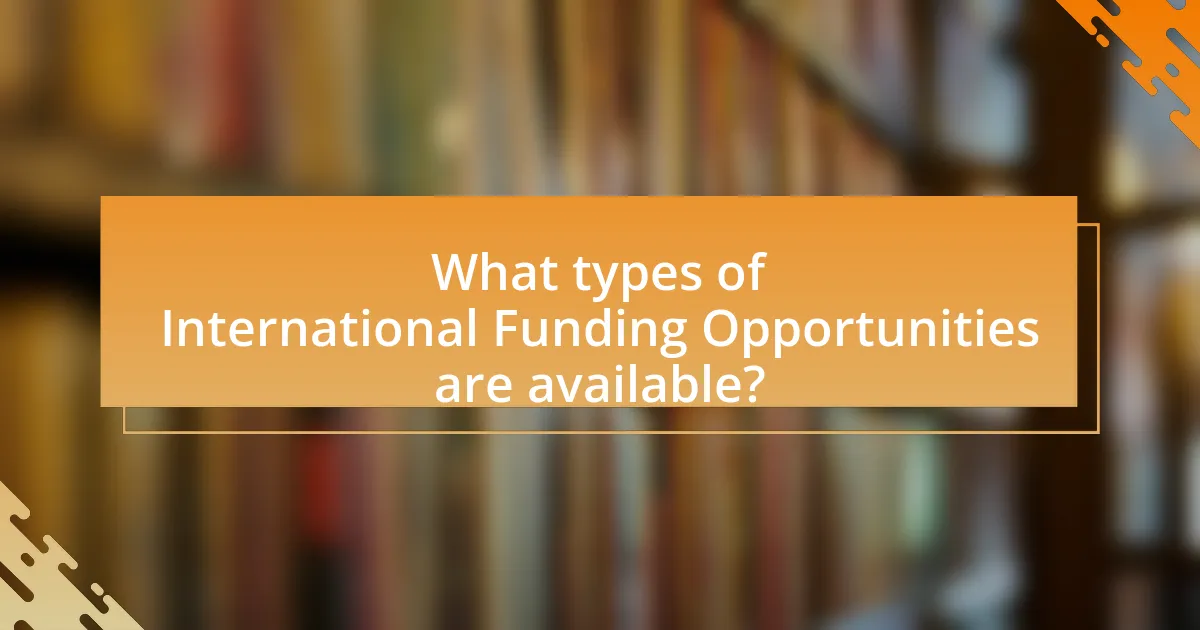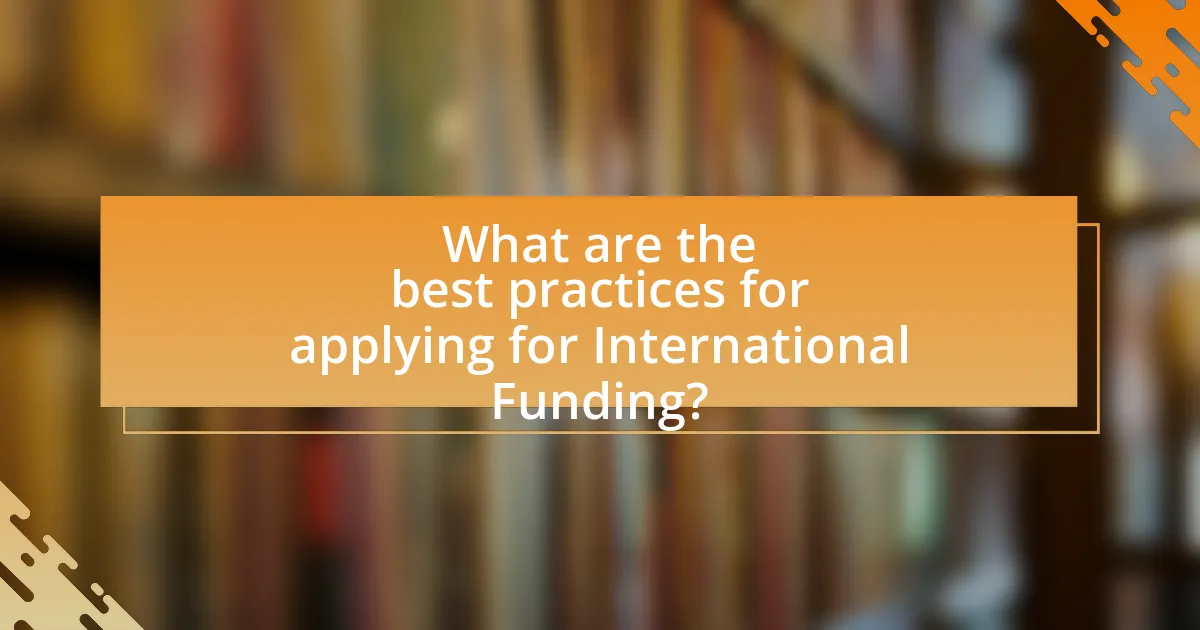The article focuses on international funding opportunities available for PhD candidates, including scholarships, grants, and fellowships from various organizations worldwide. It examines how these funding options differ across countries, influenced by economic conditions, government policies, and institutional support. The article also highlights the impact of cultural differences on funding applications, the importance of seeking international funding for enhancing research capabilities, and the advantages it provides for academic profiles. Additionally, it outlines best practices for applying for funding, including proposal tailoring, common mistakes to avoid, and strategies to strengthen applications and letters of recommendation.

What are International Funding Opportunities for PhD Candidates?
International funding opportunities for PhD candidates include scholarships, grants, and fellowships offered by various organizations and institutions worldwide. Notable examples include the Fulbright Program, which provides funding for international educational exchange, and the Erasmus Mundus Joint Doctorate, which supports international collaboration in doctoral studies. Additionally, organizations like the United Nations and the World Health Organization offer specific grants for research in areas aligned with their missions. These funding sources often require candidates to meet specific eligibility criteria, such as academic excellence and research proposals that align with the funding organization’s goals.
How do these funding opportunities vary across different countries?
Funding opportunities for PhD candidates vary significantly across different countries due to factors such as government policies, economic conditions, and institutional support. For instance, in the United States, funding is often provided through a combination of federal grants, university assistantships, and private scholarships, with the National Science Foundation and National Institutes of Health being major sources. In contrast, European countries like Germany offer tuition-free education and substantial stipends through programs like the DAAD (German Academic Exchange Service), which supports international students. Additionally, countries such as Australia provide funding through competitive scholarships like the Research Training Program, which is designed to attract high-caliber international candidates. These variations reflect each country’s approach to higher education funding, influenced by their economic priorities and educational policies.
What factors influence the availability of funding in various regions?
The availability of funding in various regions is influenced by economic conditions, government policies, and institutional support. Economic conditions, such as GDP growth and unemployment rates, directly affect the financial resources available for funding initiatives. For instance, regions with higher GDP tend to have more robust funding opportunities due to increased investment in education and research. Government policies, including grants, tax incentives, and funding programs, play a crucial role in shaping the funding landscape; countries with proactive funding strategies often see greater availability of resources for PhD candidates. Additionally, institutional support from universities and research organizations can enhance funding access by providing scholarships, fellowships, and partnerships with industry, thereby creating a more favorable environment for securing financial assistance.
How do cultural differences impact funding applications?
Cultural differences significantly impact funding applications by influencing communication styles, expectations, and evaluation criteria. For instance, in some cultures, a direct approach is preferred, while others may value indirect communication, which can affect how proposals are presented and perceived. Additionally, cultural norms regarding hierarchy and authority can shape the way applicants interact with funding bodies, potentially affecting their chances of success. Research indicates that understanding these cultural nuances can enhance the effectiveness of applications, as evidenced by a study published in the Journal of International Business Studies, which found that culturally aware applicants had a higher success rate in securing funding.
Why is it important for PhD candidates to seek international funding?
It is important for PhD candidates to seek international funding because it enhances their research capabilities and broadens their academic networks. Accessing international funding allows candidates to pursue innovative projects that may not be feasible with local resources, thereby increasing the quality and impact of their research. Additionally, international funding often provides opportunities for collaboration with global experts, fostering knowledge exchange and enhancing the candidate’s visibility in the academic community. This is supported by data indicating that research funded through international grants tends to have higher citation rates, reflecting its significance and influence in the field.
What advantages does international funding provide for research projects?
International funding provides significant advantages for research projects, including access to a broader pool of resources, enhanced collaboration opportunities, and increased visibility. Access to diverse funding sources allows researchers to secure larger budgets, which can facilitate more comprehensive studies and innovative methodologies. Enhanced collaboration opportunities arise from partnerships with international institutions, leading to knowledge exchange and shared expertise. Increased visibility can attract further funding and interest in the research, as projects backed by international funding often gain recognition in the global academic community.
How can international funding enhance a candidate’s academic profile?
International funding can significantly enhance a candidate’s academic profile by providing access to resources that facilitate research, networking, and collaboration on a global scale. This funding allows candidates to participate in international conferences, workshops, and collaborative projects, which can lead to increased visibility and recognition in their field. For instance, candidates who receive funding from organizations like the Fulbright Program or the Erasmus Mundus initiative often gain opportunities to publish their work in prestigious journals and establish connections with leading experts, thereby elevating their academic standing. Additionally, research shows that funded candidates are more likely to complete their degrees on time and achieve higher academic performance, as financial support alleviates stress and allows for greater focus on their studies.

What types of International Funding Opportunities are available?
International funding opportunities for PhD candidates include scholarships, grants, fellowships, and research funding. Scholarships, such as the Fulbright Program, provide financial support for international study, while grants from organizations like the National Science Foundation offer funding for specific research projects. Fellowships, such as those from the Marie Skłodowska-Curie Actions, support researchers in various fields and often include stipends and travel allowances. Research funding can also be obtained from international agencies like the World Health Organization, which funds health-related research initiatives. These funding types are essential for supporting the academic and research endeavors of PhD candidates globally.
What are the main categories of funding sources for PhD candidates?
The main categories of funding sources for PhD candidates include scholarships, grants, fellowships, assistantships, and loans. Scholarships are typically merit-based awards that do not require repayment, while grants are funds provided by government or private organizations for specific research projects. Fellowships often offer financial support along with mentorship and professional development opportunities. Assistantships involve working for the university in teaching or research roles in exchange for tuition waivers and stipends. Loans are borrowed funds that must be repaid, usually with interest. Each category serves to alleviate the financial burden of pursuing a PhD, enabling candidates to focus on their studies and research.
How do government grants differ from private scholarships?
Government grants differ from private scholarships primarily in their funding sources and eligibility criteria. Government grants are typically funded by federal or state governments and often require applicants to meet specific criteria related to financial need, academic performance, or project proposals. In contrast, private scholarships are funded by individuals, organizations, or corporations and may have varied eligibility requirements, including merit-based criteria, specific fields of study, or demographic factors. For instance, the U.S. Department of Education administers federal grants like Pell Grants, which are aimed at low-income students, while private scholarships can be awarded based on a wide range of factors, such as community service or athletic ability.
What role do international organizations play in funding PhD research?
International organizations play a crucial role in funding PhD research by providing grants, scholarships, and financial support to students and institutions. These organizations, such as the United Nations, World Bank, and various foundations, allocate resources to promote academic research that aligns with global priorities, such as sustainable development, health, and education. For instance, the European Union’s Horizon 2020 program has invested over €80 billion in research and innovation, significantly benefiting PhD candidates across Europe. This funding not only supports individual researchers but also fosters international collaboration and knowledge exchange, enhancing the overall quality and impact of academic research.
How can PhD candidates identify suitable funding opportunities?
PhD candidates can identify suitable funding opportunities by utilizing academic databases, university resources, and funding agency websites. Academic databases such as ProQuest and JSTOR often list grants and scholarships available for research projects. Additionally, universities typically have dedicated offices or staff that assist students in finding funding, providing access to internal grants and external funding sources. Funding agency websites, including those of government bodies and private foundations, offer comprehensive listings of available grants, eligibility criteria, and application processes. According to a study by the National Science Foundation, over 50% of PhD candidates secure funding through institutional resources, highlighting the importance of leveraging university support in the funding search.
What resources are available for researching funding options?
Resources available for researching funding options include online databases, government websites, academic institutions, and nonprofit organizations. Online databases such as GrantForward and ProQuest provide comprehensive listings of funding opportunities tailored for researchers. Government websites like Grants.gov and the National Institutes of Health (NIH) offer specific funding information and application guidelines. Academic institutions often have dedicated offices for research funding that provide resources and support for PhD candidates. Nonprofit organizations, such as the Fulbright Program and the American Association of University Women (AAUW), also offer funding opportunities specifically for graduate students. These resources collectively facilitate access to a wide range of funding options for PhD candidates.
How can networking assist in discovering funding opportunities?
Networking can significantly assist in discovering funding opportunities by connecting individuals with potential funders and collaborators. Through networking, PhD candidates can engage with industry professionals, academic mentors, and peers who may have insights into available grants, scholarships, or investment opportunities. For instance, attending conferences or workshops allows candidates to meet representatives from funding organizations, increasing their chances of learning about specific funding programs tailored to their research areas. Additionally, studies show that 70% of job openings and funding opportunities are filled through networking, highlighting its effectiveness in uncovering resources that may not be publicly advertised.

What are the best practices for applying for International Funding?
The best practices for applying for international funding include thorough research on funding sources, tailoring applications to specific requirements, and demonstrating the impact of the proposed research. Conducting comprehensive research helps identify suitable funding bodies that align with the project’s goals, such as the Fulbright Program or the Erasmus Mundus scholarship, which have specific eligibility criteria and focus areas. Tailoring applications ensures that candidates address the unique requirements and priorities of each funding organization, increasing the likelihood of success. Furthermore, clearly articulating the potential impact of the research on the field and society can significantly enhance the application, as funding bodies often prioritize projects that promise substantial contributions.
How should PhD candidates prepare their funding applications?
PhD candidates should prepare their funding applications by thoroughly researching available funding sources and tailoring their proposals to meet specific requirements. This involves identifying grants, scholarships, and fellowships that align with their research interests and academic goals. Candidates must carefully read the application guidelines, ensuring they address all criteria and provide necessary documentation. Additionally, they should articulate a clear research proposal, including objectives, methodology, and potential impact, while demonstrating their qualifications and fit for the funding opportunity. Evidence shows that well-structured applications that directly respond to funders’ priorities significantly increase the chances of securing funding.
What key elements should be included in a successful application?
A successful application for international funding opportunities for PhD candidates should include a clear research proposal, a well-defined budget, strong letters of recommendation, and a compelling personal statement. The research proposal must outline the objectives, methodology, and significance of the study, demonstrating its relevance to the funding body’s priorities. A detailed budget justifies the financial request, ensuring all costs are accounted for and aligned with the project’s goals. Letters of recommendation from credible sources validate the candidate’s qualifications and potential for success. Lastly, a personal statement should articulate the candidate’s motivation, academic background, and future aspirations, making a strong case for why they deserve the funding. These elements collectively enhance the application’s credibility and alignment with funding criteria, increasing the likelihood of approval.
How can candidates tailor their proposals to specific funding bodies?
Candidates can tailor their proposals to specific funding bodies by thoroughly researching the funding organization’s priorities, guidelines, and past funded projects. This approach allows candidates to align their project objectives with the funding body’s mission and criteria, increasing the likelihood of approval. For instance, if a funding body emphasizes innovation in technology, candidates should highlight the innovative aspects of their research and how it contributes to technological advancements. Additionally, candidates should use the specific language and terminology preferred by the funding body, as this demonstrates familiarity and respect for their framework. By customizing the proposal to reflect the funding body’s values and expectations, candidates can significantly enhance their chances of securing funding.
What common mistakes should candidates avoid in their applications?
Candidates should avoid vague language and generic statements in their applications. Specificity enhances clarity and demonstrates a strong understanding of the funding opportunity. For instance, tailoring the application to align with the funder’s goals and providing concrete examples of past achievements can significantly improve the chances of success. Research indicates that applications with clear, specific objectives and relevant experiences are more likely to be favorably reviewed, as evaluators seek candidates who can articulate their fit for the funding.
How can poor proposal writing impact funding chances?
Poor proposal writing significantly reduces funding chances by failing to clearly communicate the project’s objectives and significance. When proposals lack clarity, coherence, or persuasive arguments, they fail to engage reviewers, who often have limited time to assess numerous submissions. Research indicates that well-structured proposals are 50% more likely to receive funding compared to poorly written ones, as they effectively convey the project’s value and feasibility. Thus, inadequate writing not only obscures the proposal’s merits but also diminishes the likelihood of securing financial support.
What are the pitfalls of not following application guidelines?
Not following application guidelines can lead to disqualification from funding opportunities. Many funding bodies have strict criteria that must be met for an application to be considered, including specific formatting, required documents, and submission deadlines. For instance, a study by the National Science Foundation found that 30% of applications were rejected due to non-compliance with submission guidelines. This highlights the critical importance of adhering to the specified requirements to ensure eligibility and increase the chances of securing funding.
What tips can enhance the chances of securing funding?
To enhance the chances of securing funding, PhD candidates should develop a compelling research proposal that clearly outlines the significance, methodology, and expected outcomes of their study. A well-structured proposal demonstrates the candidate’s understanding of the field and the potential impact of their research, which is crucial for attracting funding. Additionally, candidates should tailor their applications to align with the specific goals and priorities of the funding organization, as this increases relevance and appeal. Networking with professionals in the field and seeking feedback from mentors can also strengthen applications, as insights from experienced individuals can highlight areas for improvement and enhance the overall quality of the proposal.
How can candidates effectively showcase their research impact?
Candidates can effectively showcase their research impact by quantifying their contributions through metrics such as citation counts, publication impact factors, and the practical applications of their findings. For instance, a study published in the Journal of Research Evaluation indicates that research with higher citation counts is perceived as having greater impact, demonstrating the importance of visibility in academic circles. Additionally, candidates should highlight collaborations with industry or community stakeholders that resulted in tangible outcomes, such as policy changes or technological advancements, to illustrate the real-world relevance of their work.
What strategies can be employed to strengthen letters of recommendation?
To strengthen letters of recommendation, candidates should provide recommenders with specific examples of their achievements and contributions. This approach allows recommenders to craft personalized letters that highlight the candidate’s unique strengths and experiences. For instance, sharing details about relevant projects, skills, or accomplishments enables the recommender to include concrete evidence of the candidate’s capabilities, making the letter more compelling. Additionally, candidates should choose recommenders who are familiar with their work and can speak to their qualifications in the context of the funding opportunity, thereby enhancing the credibility of the recommendation.



